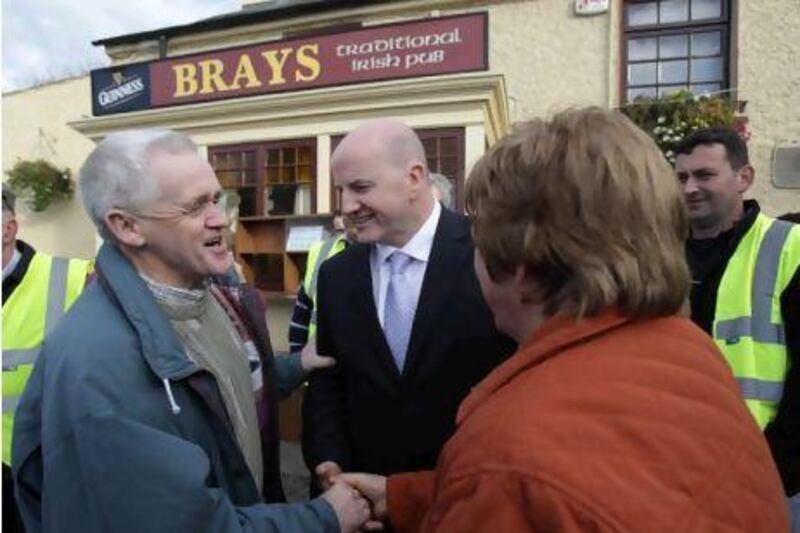DUBLIN // If the latest polling figures hold up, Ireland could be about to elect a reality TV star as head of state, becoming the first country in the world to take democracy to a grimly foreseeable new level.
Several polls published on Monday showed the independent candidate Seán Gallagher, 49, a regular panellist on the Irish version of the internationally syndicated investment show Dragons' Den, with a 15-point lead over his nearest rival ahead of voting in today's presidential ballot.
Barring a massive last-minute swing to the veteran Labour parliamentarian Michael D Higgins, Mr Gallagher - also a one-time aerobics teacher - will become Ireland's head of state, a role hitherto reserved for only the most august statesmen and constitutional lawyers.
Other candidates standing in his way include a former IRA commander, a Eurovision song contest winner, a gay-rights pioneer and the former lord mayor Gabriel "Gay" Mitchell.
But if he can overcome such opposition and gain election, Mr Gallagher would set an interesting precedent for would-be political beauty contestants in other "mature democracies", where increasing numbers of citizens are more likely to vote in a reality show poll than to participate in political elections.
Apart from relentless positivity and an affable on-screen personality, Mr Gallagher owes his success to shrewd positioning, having presented himself as a non-political candidate at a time when most Irish people, plunged into debt and despair by a burst property bubble, are furious with their ruling elites.
His achievement is all the more remarkable in that he is far from a political outsider. Over the past three decades Mr Gallagher acted variously as a youth activist, full-time adviser, national executive member and fund-raiser for the Fianna Fail party. Only a month after he resigned from the party, in January this year, Fianna Fail was hounded from office for having led the state to financial and political ruin.
Despite a string of media revelations about his ties to Fianna Fail and claims of dubious accounting in some of his firms, his support doubled and then doubled again over the past month, reaching 40 per cent on Monday.
The pro-enterprise candidate has also shrugged off reports that his business record is not all that one might expect from a panellist on Dragon's Den, in which members of the public pitch their business ideas to a panel of supposedly successful and proven investors. According to his tax returns, the self-styled entrepreneur earned a mere €12,133 (Dh62,100) before tax last year.
"If he wins it's all down to the cult of television celebrity, and if it works in Ireland, it will work elsewhere too," said Henry McDonald, the Ireland editor for TheGuardian newspaper.
"Also, a lot of the other guys are seen as party animals, and he's managed to escape that somehow. And I've watched him on the stump. He knows how to work the crowd."
It remains to be seen whether Mr Gallagher's meteoric rise will be checked by last-minute revelations of his involvement - previously denied - in collecting money for his old party at a secretive benefit dinner for business and property insiders in his home county of Louth.
If so, he will not be the only candidate to take a bruising in the course of this campaign. Pundits have already proclaimed the 2011 presidential election one of the most vicious campaigns in modern Irish political history, despite the fact that so little is at stake. The Irish presidency is modelled closely on the constitutional monarchy of the former colonial power, Britain, and brings a generous salary but only limited powers.
The Sinn Fein leader and former IRA commander Martin McGuinness, who stood down as deputy first minister of Northern Ireland to stand for office south of the border, has been battered by aggressive questioning about his role in the Troubles, despite his starring role in the 1998 peace deal that ended them. Having started strongly, he is now third in the polls, with 15 per cent.
The Joycean scholar and gay-rights pioneer, David Norris, saw his early lead collapse following the leaking of a letter he wrote to an Israeli court in 1997 pleading for clemency for his former lover, an Israeli anti-Zionist activist who had been convicted of having an affair with an underage Palestinian. The Israeli embassy has denied leaking the letter to embarrass Mr Norris, an outspoken critic of Israeli policies.
The Fine Gael candidate Gabriel 'Gay' Mitchell launched his campaign on October 3 - and promptly became bogged down in controversy when he promised on Newstalk's The Right Hook radio programme to "jump off O'Connell Bridge" if he were asked to smile. The comment was described as "unfortunate" by suicide awareness campaigners.
However, far worse was to befall Dana Rosemary Scallan, a conservative Catholic who, in an eerie prefigurement of Mr Gallagher's TV-fuelled campaign, owes her fame to having won the 1970 Eurovision song contest for Ireland with All Kinds of Everything. Her flagging campaign flatlined after it emerged, in part due to her own meltdown on live television, that she was bitterly estranged from half of her immediate family because of a business dispute, and over allegations of sex abuse made by her niece against her brother, who is also her campaign manager.
Then, when a tyre blew out on her campaign car, she told the police that she believed someone had tampered with it.
The police later concluded that the tyre had disintegrated because it had been driven while flat: a tidy metaphor for the entire presidential campaign.






